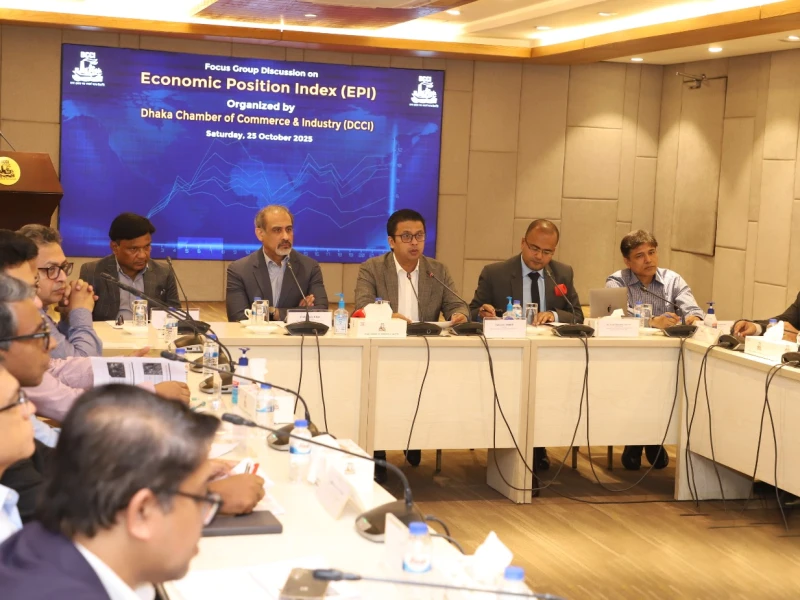The manufacturing sector contributes 56 percent to Dhaka district’s economy, outweighing the service sector’s 44 percent share, according to a new study conducted by the Dhaka Chamber of Commerce and Industry (DCCI) as part of its initiative to develop an Economic Position Index (EPI).
The EPI, aimed at providing a real-time and data-driven assessment of the country’s economic activities, was discussed at a Focus Group Discussion organized by DCCI on Saturday at the DCCI Auditorium. The initiative seeks to formulate specific policy recommendations to strengthen the economy.
A.K.M. Asaduzzaman Patwary, Acting Secretary General of DCCI, presented the keynote paper, explaining that the study surveyed 654 respondents during February–March 2025 — 365 from the manufacturing sector and 289 from the services sector.
The manufacturing sample included eight industries: food products, textiles, ready-made garments, leather and leather goods, pharmaceuticals, medicinal chemicals and botanical products, rubber and plastic products, other non-metallic mineral products, and basic metals. The services sector comprised wholesale and retail trade, land transport, and real estate activities.
Patwary emphasized that government priorities should include improving law and order, ensuring uninterrupted industrial energy supply, strengthening the financial sector, simplifying loan disbursement and reducing interest rates, enhancing trade-supporting infrastructure, boosting local supply chains, expanding export markets, and lowering VAT on import-export goods.
Former DCCI President Abul Kasem Khan highlighted that the ready-made garment sector enjoys disproportionate benefits compared to other industries, making direct comparisons difficult. He stressed the importance of SME development, digitization of trade license issuance, and comparative assessments with competitor countries to enhance policy relevance.
Md. Nurul Alam, Director General of the National Productivity Organisation, called for careful and accurate data collection to guide policy decisions, while former DCCI President Ashraf Ahmed underscored the role of statistical analysis in supporting future research initiatives.
International trade expert Nesar Ahmed noted that Bangladesh has already utilized most pre-LDC graduation benefits and recommended refining research questionnaires for higher accuracy.
Syed Muntasir Mamun, Director General of International Trade, Investment & Technology Wing at the Ministry of Foreign Affairs, suggested including the agriculture sector to provide a more comprehensive economic picture and highlighted the importance of maintaining foreign investor confidence.
Saif Uddin Ahammad, Joint Secretary at the Ministry of Commerce and CEO (Additional Charge) of Bangladesh Foreign Trade Institute, called for greater coordination between DCCI’s data and other institutional datasets, along with the inclusion of more sector-specific and diversified information, including light engineering and service industries.
The DCCI said the EPI will serve as a key policy-support tool, offering insights into production, sales, orders, exports, employment, and investment trends, thereby helping policymakers take timely and informed economic decisions.


 Prev Post :
Prev Post :
